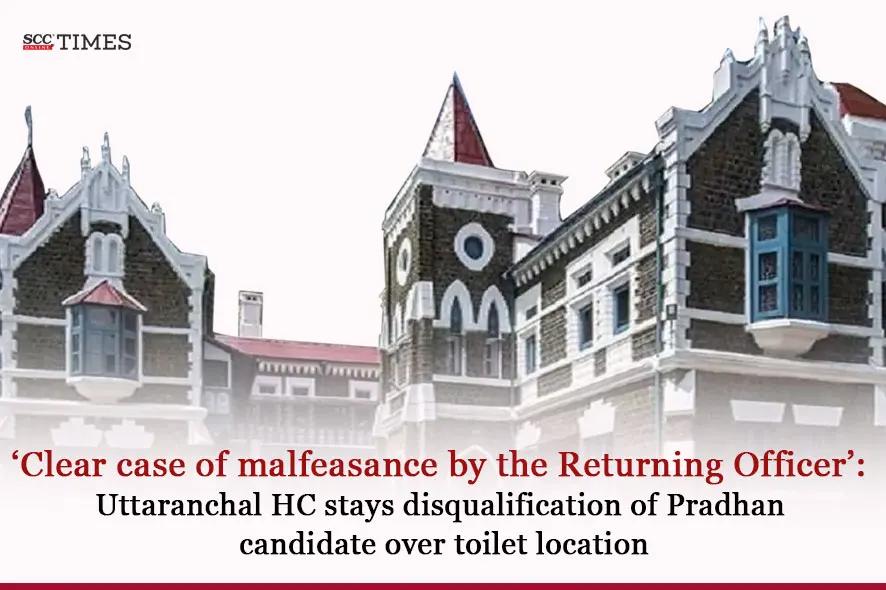Uttaranchal High Court: In a writ petition filed by a candidate for the post of Pradhan, Gram Panchayat Udvakhand, District Tehri Garhwal challenging the order of disqualification on the grounds of the location of a toilet at her house, a Division Bench of G. Narendar, C.J., and Alok Mahra, J., stayed the operation of the order finding prima facie a clear case of malfeasance by the Returning Officer, who exceeded his powers by misinterpreting the Uttarakhand Panchayati Raj Act, 2016, and arbitrarily rejecting the nomination despite evidence of a toilet being present at a distance of 150 meters from the dwelling house of the petitioner.
Background
The petitioner was a candidate for the post of Pradhan, Gram Panchayat Udvakhand, District Tehri Garhwal. A complaint was lodged alleging that there was no toilet in the petitioner’s house. Based on this complaint, the Returning Officer directed a local inspection by the Village Panchayat Development Officer. The Village Panchayat Development Officer conducted an inquiry and submitted a report stating that “though the toilet has been constructed, the same is situated at a distance of 150 meters from the dwelling house of the candidate”. This report indicated the presence of a toilet, but not one attached to the dwelling house. The petitioner contended that she was not furnished with a copy of the complaint, nor was she given an opportunity to provide an explanation. Instead, a local inquiry was ordered straightaway, a report obtained, and photographs were taken. The petitioner’s nomination was rejected due to the toilet not being within the dwelling house of the candidate. Hence, the petitioner filed the present writ petition against her disqualification.
Analysis and Decision
After perusing the photographs, the Court noted that they clearly demonstrated the presence of the toilet. In that context, the Court said that the impugned order, prima facie, appeared to constitute a clear case of malfeasance, where the authority had sought to exercise its power in an arbitrary and mala fide manner, likely with the intent to facilitate the election of a favoured candidate. Since the election was for the post of Pradhan, it appeared that the Returning Officer had exceeded his powers by attempting to interpret clause (b) of sub-section (3) of Section 8 of the Uttarakhand Panchayati Raj Act, 2016 (‘Act’).
The Court noted that it is a known and prevalent practice in villages of constructing toilets at a distance from the dwelling house for reasons of hygiene. There was no finding by the Returning Officer that the toilet did not belong to the petitioner or was not constructed by her.
The Court perused clause (b) of sub-section (3) of Section 8 of the Act, noted that prima facie, the section did not support the interpretation of the Standing Counsel for the State Election Commission that the toilet should be within the dwelling house of the candidate. The Court further noted that this was not just a mere case of improper rejection of nomination, but a classic case of abuse of power.
The Court noted that there being no ambiguity; the Returning Officer ought not to have indulged in an interpretational exercise and should have left it to the Tribunal. If it was a case of there being no toilet at all, it would have been open for the Returning Officer to take a call, but where the matter required interpretation of the provisions, the Court observed that the Returning Officer had exceeded the brief. The Court noted that the right to contest elections is a statutorily guaranteed right, and the same cannot be denied in a completely arbitrary and prima facie illegal manner.
With regards to the contention that the present writ petition was barred by Article 243-O(b) of the Constitution, the Court said that the question in the present writ petition was not the election of any candidate, but the per se illegal rejection of the petitioner’s nomination, for which there was no efficacious remedy. The Court noted that the relief claimed was in furtherance of the elections and not in detriment of the election.
The Court noted that the “plain reading of Clause (b) of Article 243-O of the Constitution of India makes it apparent that the same is related to the questioning of a Panchayat Election, in other words, where the relief prayed, if granted would result in postponement, putting off the elections or would derail the election”. The challenge being to the rejection of the nomination of the petitioner, the Court, prima facie, was of the view that the said bar does not appear to operate in a case of instant nature.
The Court also considered Section 131H(1)(b) of the Uttarakhand Panchayati Raj Act, 2016, which allows for an application regarding election and revision if the result of the election has been affected by improper acceptance or rejection of nomination. The Court noted that if it was a case of improper rejection, this provision would certainly apply. However, the Court prima facie found the rejection to be illegal, particularly when the inquiry ordered by the Returning Officer himself disclosed the presence of a toilet.
The Court held that this was a clear case of malfeasance by the Returning officer. The Court stayed the operation of the order of rejection. The Court directed the Returning Officer to assign a symbol to the petitioner, print her name on the ballot paper, and permit her to participate in the election process. Further, the State Election Commissioner was directed to conduct an inquiry into this aspect of the matter and submit a report by the next date of the hearing. A copy of this order was directed to be forwarded to the Returning Officer by e-mail. The case was listed for a final hearing on 11-08-2025.
[A v. B, 2025 SCC OnLine Utt 2172, decided on 16-07-2025]
Advocates who appeared in this case :
For the Petitioner: Abhijay Negi, Snigdha Tiwari, Ayush Pokhriyal, Advocates
For the Respondent: Sanjay Bhatt, Advocate



